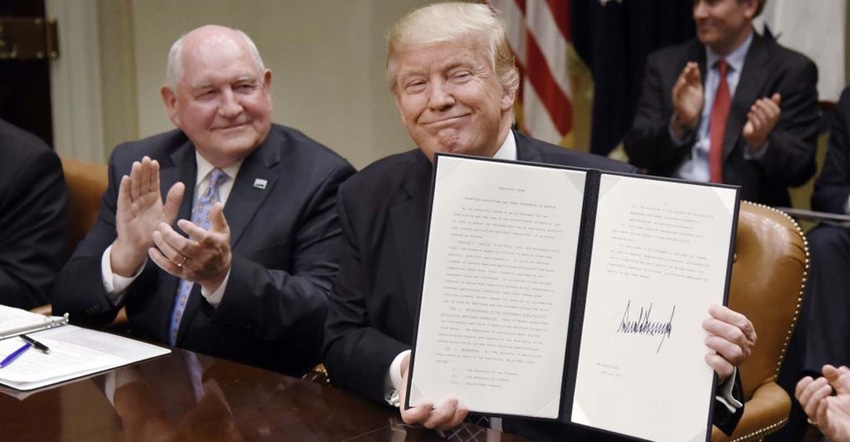April 26, 2017

President Trump asked Agriculture Secretary Sonny Perdue to establish a task force that does a 180-day review of regulations, policies and legislation "that unnecessarily hinders economic growth in the agricultural sector."
The executive order establishing the Interagency Task Force on Agriculture and Rural Prosperity was issued April 25, Perdue's first day in office as agriculture secretary. The order also sunset the Rural Council, which existed during the Obama administration.
“It is in the national interest to promote American agriculture while protecting and supporting the rural communities where food, forestry, fiber, and renewable fuels are grown,” the text of the Executive Order reads. “It is further in the national interest to ensure that regulatory burdens do not unnecessarily encumber agricultural production, constrain economic growth, hamper job creation, or increase the cost of food for Americans and our customers around the world.”
Ray Starling, special assistant to the president for agriculture, trade and food assistance, said the task force will include a number of cabinet secretaries and White House officials and it will do outreach and accept ideas from state and local officials. Members will come from the following agencies and departments:
Secretary of the Treasury;
Secretary of Defense;
Attorney General;
Secretary of the Interior;
Secretary of Commerce;
Secretary of Labor;
Secretary of Health and Human Services;
Secretary of Transportation;
Secretary of Energy;
Secretary of Education;
Administrator of the Environmental Protection Agency;
Chairman of the Federal Communications Commission;
Director of the Office of Management and Budget;
Director of the Office of Science and Technology Policy;
Director of the Office of National Drug Control Policy;
Chairman of the Council of Economic Advisers;
Director of the Domestic Policy Council;
Director of the National Economic Council;
Administrator of the Small Business Administration;
United States Trade Representative;
Director of the National Science Foundation; and
Heads of such other executive departments, agencies, and offices as the President or the Secretary of Agriculture may, from time to time, designate.
In addition to focusing on agriculture, the task force will look at rural communities and make recommendations for promoting their economic stability, Starling said. He said the group will also talk about immigration and workforce issues, and regulations.
“The multiple functions of the task force will help move our industry forward, and specific directives like addressing regulatory barriers farmers face and investing in the infrastructure on which our industry depends will directly address some of our most significant challenges," said American Soybean Association president Ron Moore, a farmer from Roseville, Illinois. "As the task force begins its work, we want to ensure a constant line of communication between ASA and other farm organizations and the task force so that this group can function as effectively and successfully as possible. We look forward to opportunities to sit down with President Trump, Secretary Perdue, and others in the administration to provide input on how the task force can best serve soybean farmers.”
The president and Perdue also held a roundtable discussion with people from the agriculture industry on April 25. They met with:
Luke Brubaker of Pennsylvania, dairy farmer and chair of the Pennsylvania Milk Marketing Board
Hank Choate of Michigan, dairy farmer
Tom Demaline of Ohio, president of Willoway Nurseries and vice chair, AmericanHort
Zippy Duvall of Georgia, beef cattle and poultry farmer, president, American Farm Bureau Federation
Valerie Earley of Minnesota, recent graduate of the University of Minnesota’s College of Food, Agricultural and Natural Resource Sciences; National FFA officer (central region vice president), 2016-2017
Lynetta Griner of Florida, owner/operator of Usher Land and Timber, president of the Florida Forestry Association
A.G. Kawamura of California, third-generation fruit and vegetable grower and shipper from Orange County; former secretary of the California Department of Food and Agriculture; current board member, Western Growers Association
James “Cookie” Lamb of North Carolina, hog farmer
Bill Northey of Iowa, corn and soybean farmer and secretary, Iowa Department of Agriculture
Jose Rojas of Colorado, vice president of farm operations at Hormel Foods
Terry Swanson of Colorado, owner of Swanson Farms
Maureen Torrey of New York, fresh market vegetable farmer
Steve Troxler of North Carolina, farmer and commissioner of the North Carolina Department of Agriculture & Consumer Services
Lisa Johnson-Billy, former member of the Oklahoma state house, small-farm background
The meeting included a discussion on pressing issues for American agriculture, such as trade, labor, regulatory reform and rural infrastructure, Duvall said.
“Not only was President Trump receptive to our concerns, but he pledged action,” Duvall said. “He even looked toward Secretary Perdue and said, ‘Let’s get these problems fixed.’ Today, agriculture had not just one but many seats at the table to share with the president how access to international markets, farm labor shortages and burdensome regulations impact not only the day-to-day business of our farmers and ranchers, but also the millions of jobs agriculture supports.”
“The people who are on the front lines of American agriculture don’t have the luxury of waiting to tend to their crops and livestock, so there was no better time to convene this meeting of the minds than on my first day,” Perdue said. “President Trump has made it clear that addressing the needs of rural America will be a top priority, and the message that we want to send to the agriculture community is that we are here, we are working hard, and we are on their side.”
Source: White House, ASA, AFBF, USDA
You May Also Like




